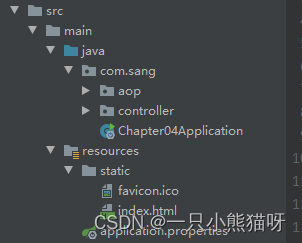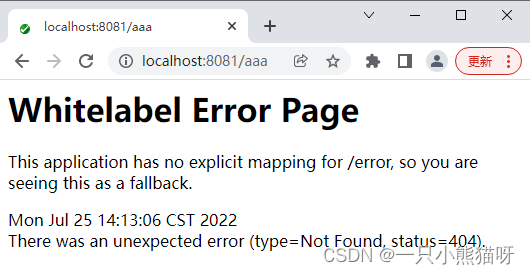SpringBoot AOP配置
一只小熊猫呀 人气:0配置AOP
AOP简介
要介绍面向切面变成(Aspect-Oriented Programming,AOP),需要先考虑一个这样的场景:公司有一个人力资源管理系统目前已经上线,但是系统运行不稳定,有时运行的很慢,为了检测到底是哪个环节出现问题了,开发人员想要监控每一个方法执行的时间,再根据这些执行时间判断出问题所在。当问题解决后,再把这些监控移除掉。系统目前已经运行,如果手动修改系统成千上万个方法,工作量太大,而且这些监控方法以后还要移除掉;如果能够在系统运行过程中动态添加代码,就能很好的解决问题。这种在系统运行时动态添加代码的方式成为面向切面编程(AOP)。Spring Boot 对 AOP 提供了很好的支持。在 AOP 中,有一些常见的概念需要了解:
- Joinpoint(连接点):类里面可以被增强的方法即为连接点。例如,想修改那个方法的功能,那么该方法就是一个连接点
- Pointcut(切入点):对 Joinpoint 进行拦截的定义即为切入点。例如,拦截所有以 insert 开始的方法,这个定义即为切入点
- Advice(通知):拦截到 Joinpoint 之后所要做的事情就是通知。例如,之前说到的打印日志监控。通知分为前置通知、后置通知、异常通知、最终通知、环绕通知
- Aspect(切面):Pointcut 和 Advice 的结合
- Target(目标对象):要增强的类成为 Target
Spring Boot 支持
Spring Boot 在 Spring 的基础上对 AOP 的配置提供了自动化配置解决方案 spring-boot-starter-aop ,首先引入依赖,如下:
<!-- AOP 依赖 --> <dependency> <groupId>org.springframework.boot</groupId> <artifactId>spring-boot-starter-aop</artifactId> </dependency>
然后在com.sang.aop.service 包下创建 UserService 类,如下:
@Service
public class UserService {
public String getUserById(Integer id){
System.out.println("get...");
return "user";
}
public void deleteUserById(Integer id){
System.out.println("delete...");
}
}
然后创建切面,如下:
@Component
@Aspect
public class LogAspect {
@Pointcut("execution(* com.sang.aop.service.*.*(..))")
public void pc1() {
}
@Before(value = "pc1()")
public void before(JoinPoint jp) {
String name = jp.getSignature().getName();
System.out.println(name + "方法开始执行...");
}
@After(value = "pc1()")
public void after(JoinPoint jp) {
String name = jp.getSignature().getName();
System.out.println(name + "方法执行结束...");
}
@AfterReturning(value = "pc1()", returning = "result")
public void afterReturning(JoinPoint jp, Object result) {
String name = jp.getSignature().getName();
System.out.println(name + "方法返回值为:" + result);
}
@AfterThrowing(value = "pc1()",throwing = "e")
public void afterThrowing(JoinPoint jp, Exception e) {
String name = jp.getSignature().getName();
System.out.println(name+"方法抛异常了,异常是:"+e.getMessage());
}
@Around("pc1()")
public Object around(ProceedingJoinPoint pjp) throws Throwable {
return pjp.proceed();
}
}
代码解释:
- @Aspect 注解表明这是一个切面类
- pc1() 方法使用了 @Pointcut() 注解 ,这是一个切入点定义。execution 中的第一个 * 表示方法返回任意值,第二个 * 表示 service 包下的任意类,第三个 * 表示类中的任意方法,括号中的两个点表示方法参数任意,即这里描述的切入点为 service 包下所有类中的所有方法
- before() 方法使用了 @Before注解 ,表示这是一个前置通知,该方法在目标方法执行之前执行。通过 JoinPoint 参数可以获取目标方法的方法名、修饰符等信息
- after() 方法使用了 @After注解,表示这是一个后置通知,该方法在目标方法执行之后执行
- afterReturning() 方法使用了 @AfterReturning 注解,表示这是一个返回通知,在该方法中可以获取目标方法的返回值。@AfterReturning 注解的 returning 参数是指返回值的变量名,对应方法的参数。注意,在方法参数中定义了 result 的类型为 Object ,表示目标方法的返回值可以使任意类型,若 result 参数的类型为 Long ,则该方法只能处理目标方法返回值为 Long 的情况
- afterThrowing() 方法使用了 @AfterThrowing 注解,表示这是一个异常通知,即当目标方法发生异常时,该方法会被调用,异常类型为 Exception 表示所有的异常都会进入该方法中执行,若异常类型为 ArithmeticException ,则表示只有目标方法抛出 ArithmeticException 异常时才会进入该方法处理
- around() 方法使用了 @Around 注解,表示这是一个环绕通知。环绕通知是所有通知里功能最为强大的通知,可以实现前置通知、后置通知、异常通知以及返回通知的功能。目标方法进入环绕通知后,通过调用 ProceedingJoinPoint 对象的 proceed 方法使目标方法继续执行,开发者可以在此修改目标方法的执行参数、返回值等,并且可以在此处理目标方法的异常
配置完成后,接下来在Controller 中创建接口,分别调用 Userservice 中的两个方法,即可看到 LogAspect 中的代码动态的嵌入目标方法中执行了,如下:
getUserById方法开始执行...
get...
getUserById方法返回值为:user
getUserById方法执行结束...
deleteUserById方法开始执行...
delete...
deleteUserById方法返回值为:null
deleteUserById方法执行结束...
其它
自定义欢迎页
Spring Boot 项目在启动后,首先会去静态资源路径下查找 index.html 作为首页文件,若查找不到,则会去查找动态的 index.html 作为首页文件。
例如,如果想使用静态的 index.html 页面作为项目的首页,只需在 resources/static 目录下创建 index.html 文件疾苦。若想使用动态页面作为项目首页,则需在 resources/templages 目录下创建 index.html (使用Thymeleaf 模板) 或者 index.ftl(使用 FreeMarker 模板),然后在 Controller 中返回逻辑视图名,如下:
@Controller
public class IndexController {
@RequestMapping("/index")
public String index(){
return "index";
}
}
运行项目,输入"http://localhost:8081",查看结果

自定义 favicon
favicon.ico 是浏览器选项卡左上角的图标,可以放在静态资源路径下或者类路径下,静态资源路径下的 favicon.ico 优先级高于类路径下的 favicon.ico
可以使用在线转换网站:https://www.bitbug.net/ 将一张普通图片转为 .ico 图片,转换成功后,将文件重命名为 favicon.ico ,然后复制到 resources/static 目录下,如图

启动项目,查看效果

注意:清缓存,然后 Ctrl+F5 强制刷新
除去某个自动配置
Spring Boot 中提供了大量的自动化配置类,在 Spring Boot 的入口类上有一个 @SpringBootApplication 注解。该注解是一个组合注解,由 @SpringBootConfiguration、@EnableAutoConfiguration、@ComponentScan 组成,其中 @EnableAutoConfiguration 注解开启自动化配置,相关的自动化配置就会被使用。如果开发者不想使用某个自动化配置,按如下方式除去相关配置即可:
@SpringBootApplication
@EnableAutoConfiguration(exclude = {ErrorMvcAutoConfiguration.class})
public class Chapter04Application {
public static void main(String[] args) {
SpringApplication.run(Chapter04Application.class, args);
}
}在 @EnableAutoConfiguration 注解中使用 exclude 属性去除 Error 的自动化配置类,这时如果在 resources/static/error 目录下创建 4xx.htnl、5xx.html ,访问出错时就不会自动跳转了。由于 @EnableAutoConfiguration 注解的 exclude 属性值是一个数组,因此有多个要排除的自动化配置文件只需要继续添加即可。除了这种配置方式外,也可在 application.properties 中配置,如下:
spring.autoconfigure.exclude=org.springframework.boot.autoconfigure.web.servlet.error.ErrorMvcAutoConfiguration
添加前

添加后

加载全部内容